Blog
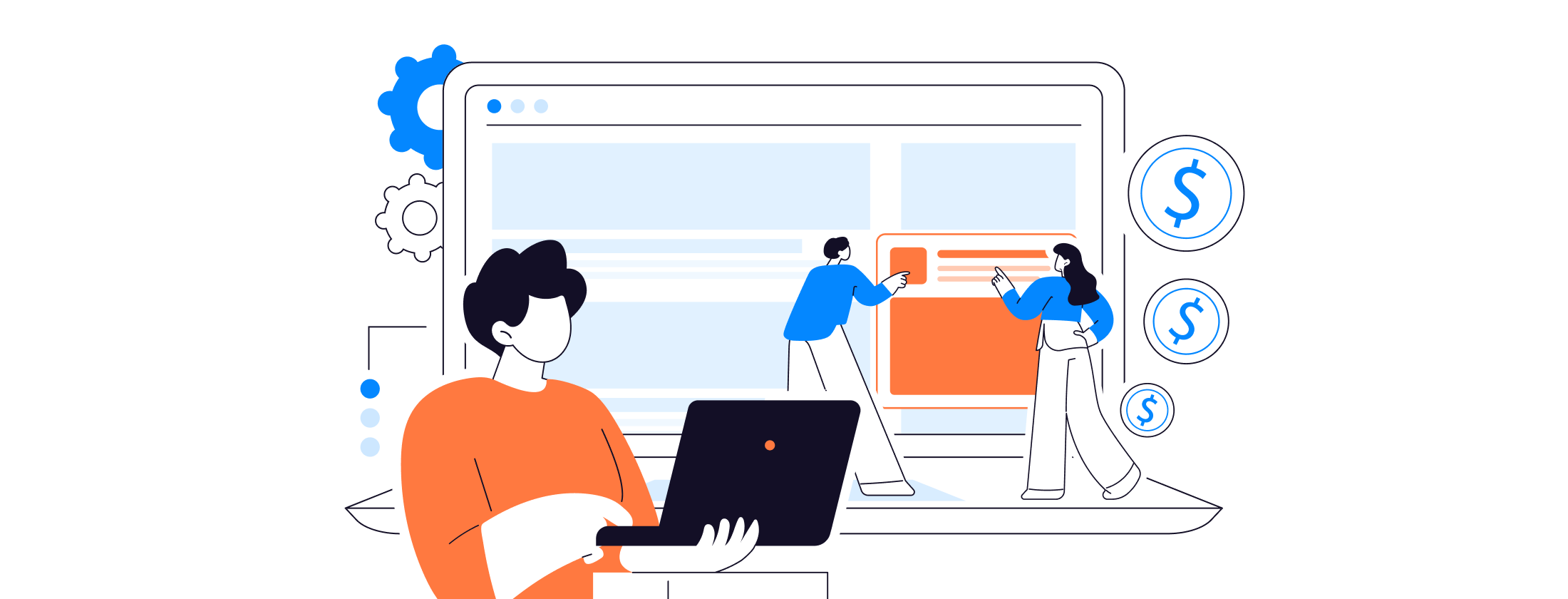
Website monetization is a prime concern for many publishers. A good ROI requires choosing the right technique among countless options. One such method that has garnered attention is the use of push ads.
In this monetization guide, we aim to assist publishers in understanding and monetizing their websites with push ads. We’ll tell you how to monetize your website and recommend tools you may find handy for this purpose.
Push notifications are clickable messages that pop up on a user’s device, usually carrying a short message, update, or advertisement. These notifications serve as a direct and effective way for businesses to stay connected with their audience in real-time, encouraging instant engagement and interaction.
To make push notifications work, publishers need to integrate specific scripts or plugins into their website’s backend. After publishers do this, website visitors will start seeing a small window asking for permission to send notifications. This window often appears at the top or bottom of users’ browsers:
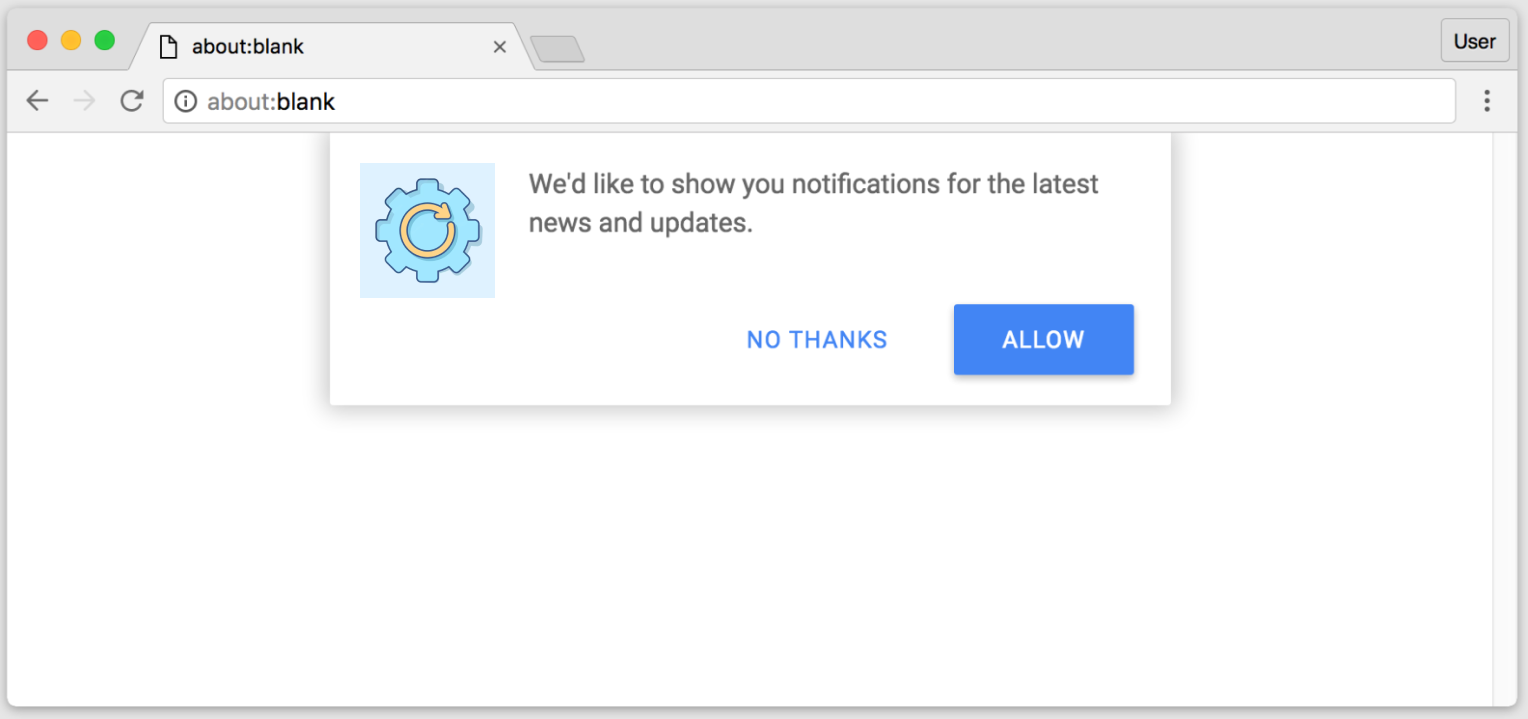
Once the user consents, the website can send push ads directly to the user’s device, even if the user isn’t actively browsing the site. This means the user will receive notifications despite leaving the site.
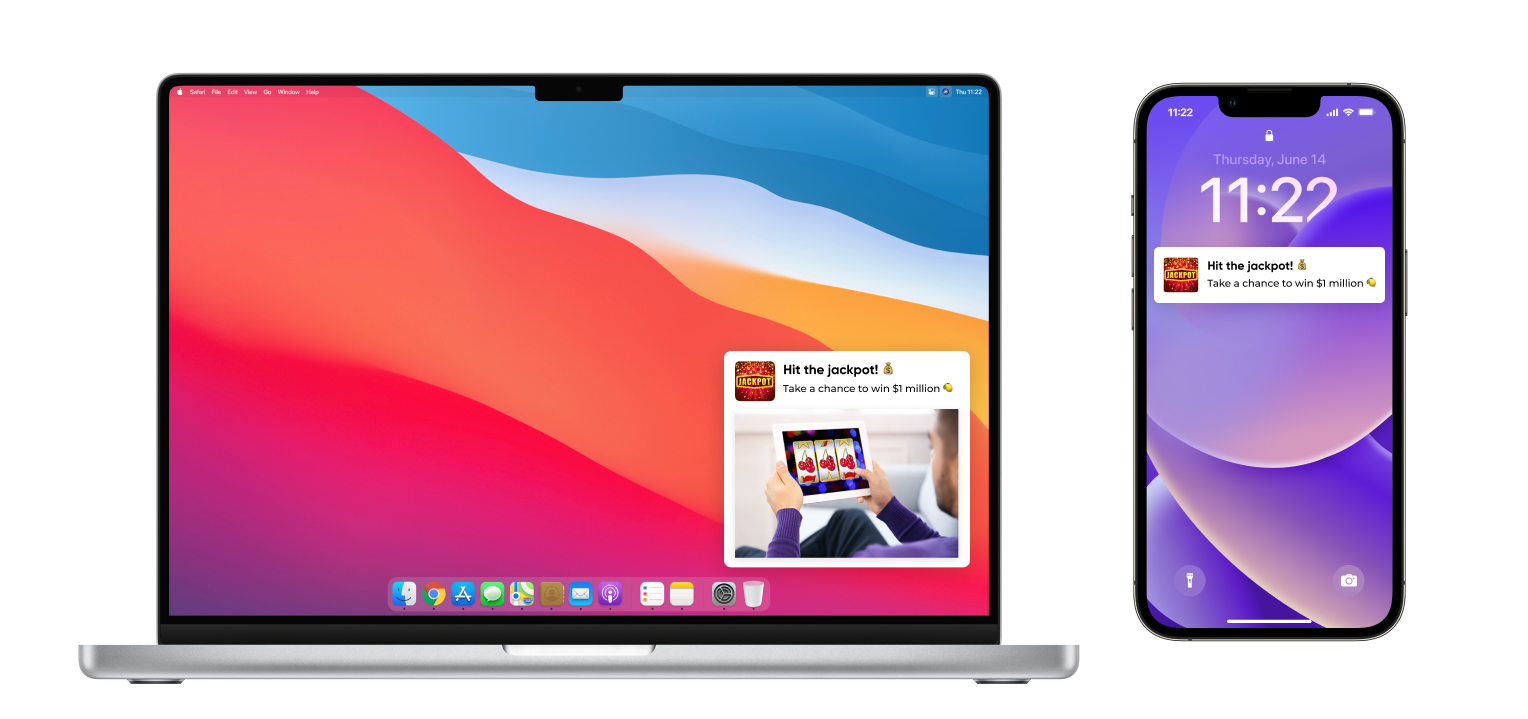
It’s crucial to note that upon receiving user consent, only device-specific details are stored in a database managed by the publisher — no personal data is collected.
Even though the website’s role in delivering notifications ends at this point, the publisher earns from subscribers who opt-in on their site. The webmaster profits from every click on the push ad.
Push notifications offer an array of benefits that can enhance client experience and boost publisher revenue.
The following are a few of its most significant advantages:
Publishers have a plethora of avenues to monetize their push traffic.
One of the most commonly used website monetization strategies is using push services.
Push services primarily empower publishers to send push notifications with their own offerings. For example, if a website sells products, it can use these services to send users advertisements about its items, alert them to limited-time offers, or distribute newsletters about company news. The downside? By using push services, only the publisher acts as the advertiser, restricting the versatility of the content delivered to the subscribers.
Ad networks, on the other hand, open up a broader spectrum. Instead of being limited to promoting their own content, publishers can take advantage of a competitive environment where multiple advertisers vie for a slot on their site. This is where the RTB (Real-Time Bidding) auction comes into play.
RTB is an automated auction process where advertisers bid in real-time for the opportunity to showcase their advertisement to a user. The highest bidder gets the ad space, ensuring that publishers receive the most competitive rates for their inventory. The beauty of this system is that it provides publishers with the opportunity to capitalize on the highest bidder’s ad, which often translates to better revenue.
The structure of ad networks is as follows:
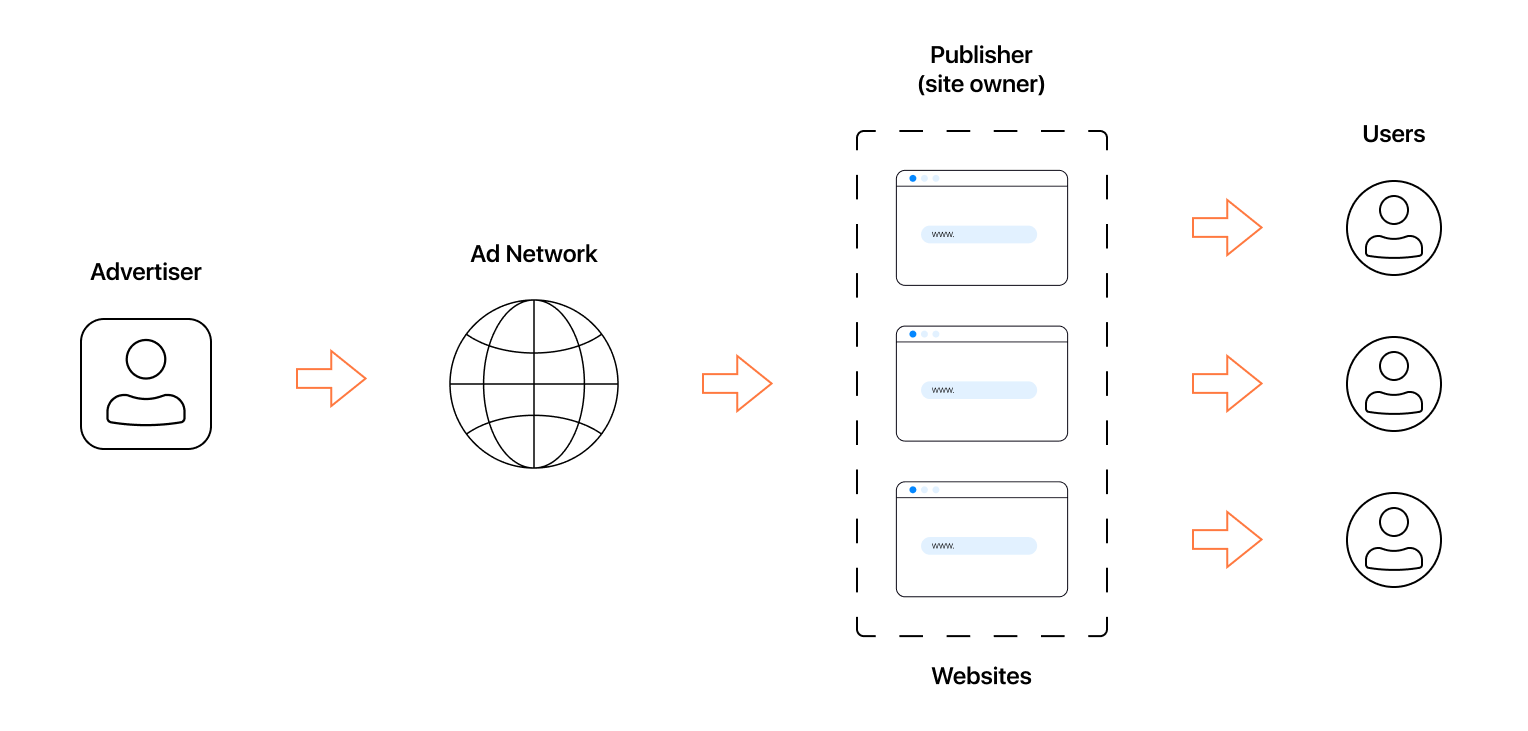
Ad networks are essentially intermediaries that connect advertisers wanting to run campaigns with publishers willing to host them. Meaning that publishers won’t have to rack their brains over the question: “How do you get advertisers on your website?”
Publishers can benefit from ad networks in a variety of ways:
The digital advertising landscape is vast, and choosing the right ad network can be the linchpin for a publisher’s monetization success. The ideal network should not only boost your revenue but also provide an enhanced experience for your audience.
As you venture into this selection process, several critical factors come into play:
Top push ad networks for publishers are Adcash, Turbecorporate, ExoClick, Clickaine, Clickadu, Vimmy, Adport, DAO.ad, Monadplug and Clickadilla.
For a detailed breakdown of top networks, we recommend reading this article:
For publishers looking to monetize their content, leveraging ad networks can be a lucrative strategy. By understanding the process and leveraging the advantages these networks provide, you can streamline your earnings from push notifications.
Here’s a succinct guide on how to use your website for revenue generation:
Step 1. Register a personal publisher’s account
Many ad platforms, recognizing the value of fresh content, offer lenient registration requirements, waiving mandatory site moderation or minimum visit restrictions.
Step 2. Install the сode on your site
Most ad networks offer a personal manager to streamline the process and provide clear instructions.
Step 3. Earn your first profit
Flexible terms mean you could be earning in no time. Look for ad networks offering frequent payouts, with a range of payment systems, and low minimum payout thresholds
Push ads have clearly emerged as a potent tool in the ever-evolving affiliate marketing world. For publishers, they represent a blend of direct user engagement, real-time communication, and monetization potential. When integrated responsibly and effectively, push notifications can serve as a win-win for both publishers and users, delivering timely content without being intrusive.
In addition to this, partnering with the right ad networks further amplifies this potential, providing publishers with a comprehensive ecosystem to skyrocket revenue.
Website monetization is a prime concern for many publishers. A good ROI requires choosing the right technique among countless options. One such method that has garnered attention is the use of push ads.
In this monetization guide, we aim to assist publishers in understanding and monetizing their websites with push ads. We’ll tell you how to monetize your website and recommend tools you may find handy for this purpose.
Push notifications are clickable messages that pop up on a user’s device, usually carrying a short message, update, or advertisement. These notifications serve as a direct and effective way for businesses to stay connected with their audience in real-time, encouraging instant engagement and interaction.
To make push notifications work, publishers need to integrate specific scripts or plugins into their website’s backend. After publishers do this, website visitors will start seeing a small window asking for permission to send notifications. This window often appears at the top or bottom of users’ browsers:

Once the user consents, the website can send push ads directly to the user’s device, even if the user isn’t actively browsing the site. This means the user will receive notifications despite leaving the site.

It’s crucial to note that upon receiving user consent, only device-specific details are stored in a database managed by the publisher — no personal data is collected.
Even though the website’s role in delivering notifications ends at this point, the publisher earns from subscribers who opt-in on their site. The webmaster profits from every click on the push ad.
Push notifications offer an array of benefits that can enhance client experience and boost publisher revenue.
The following are a few of its most significant advantages:
Publishers have a plethora of avenues to monetize their push traffic.
One of the most commonly used website monetization strategies is using push services.
Push services primarily empower publishers to send push notifications with their own offerings. For example, if a website sells products, it can use these services to send users advertisements about its items, alert them to limited-time offers, or distribute newsletters about company news. The downside? By using push services, only the publisher acts as the advertiser, restricting the versatility of the content delivered to the subscribers.
Ad networks, on the other hand, open up a broader spectrum. Instead of being limited to promoting their own content, publishers can take advantage of a competitive environment where multiple advertisers vie for a slot on their site. This is where the RTB (Real-Time Bidding) auction comes into play.
RTB is an automated auction process where advertisers bid in real-time for the opportunity to showcase their advertisement to a user. The highest bidder gets the ad space, ensuring that publishers receive the most competitive rates for their inventory. The beauty of this system is that it provides publishers with the opportunity to capitalize on the highest bidder’s ad, which often translates to better revenue.
The structure of ad networks is as follows:

Ad networks are essentially intermediaries that connect advertisers wanting to run campaigns with publishers willing to host them. Meaning that publishers won’t have to rack their brains over the question: “How do you get advertisers on your website?”
Publishers can benefit from ad networks in a variety of ways:
The digital advertising landscape is vast, and choosing the right ad network can be the linchpin for a publisher’s monetization success. The ideal network should not only boost your revenue but also provide an enhanced experience for your audience.
As you venture into this selection process, several critical factors come into play:
Top push ad networks for publishers are Adcash, Turbecorporate, ExoClick, Clickaine, Clickadu, Vimmy, Adport, DAO.ad, Monadplug and Clickadilla.
For a detailed breakdown of top networks, we recommend reading this article:
For publishers looking to monetize their content, leveraging ad networks can be a lucrative strategy. By understanding the process and leveraging the advantages these networks provide, you can streamline your earnings from push notifications.
Here’s a succinct guide on how to use your website for revenue generation:
Step 1. Register a personal publisher’s account
Many ad platforms, recognizing the value of fresh content, offer lenient registration requirements, waiving mandatory site moderation or minimum visit restrictions.
Step 2. Install the сode on your site
Most ad networks offer a personal manager to streamline the process and provide clear instructions.
Step 3. Earn your first profit
Flexible terms mean you could be earning in no time. Look for ad networks offering frequent payouts, with a range of payment systems, and low minimum payout thresholds
Push ads have clearly emerged as a potent tool in the ever-evolving affiliate marketing world. For publishers, they represent a blend of direct user engagement, real-time communication, and monetization potential. When integrated responsibly and effectively, push notifications can serve as a win-win for both publishers and users, delivering timely content without being intrusive.
In addition to this, partnering with the right ad networks further amplifies this potential, providing publishers with a comprehensive ecosystem to skyrocket revenue.
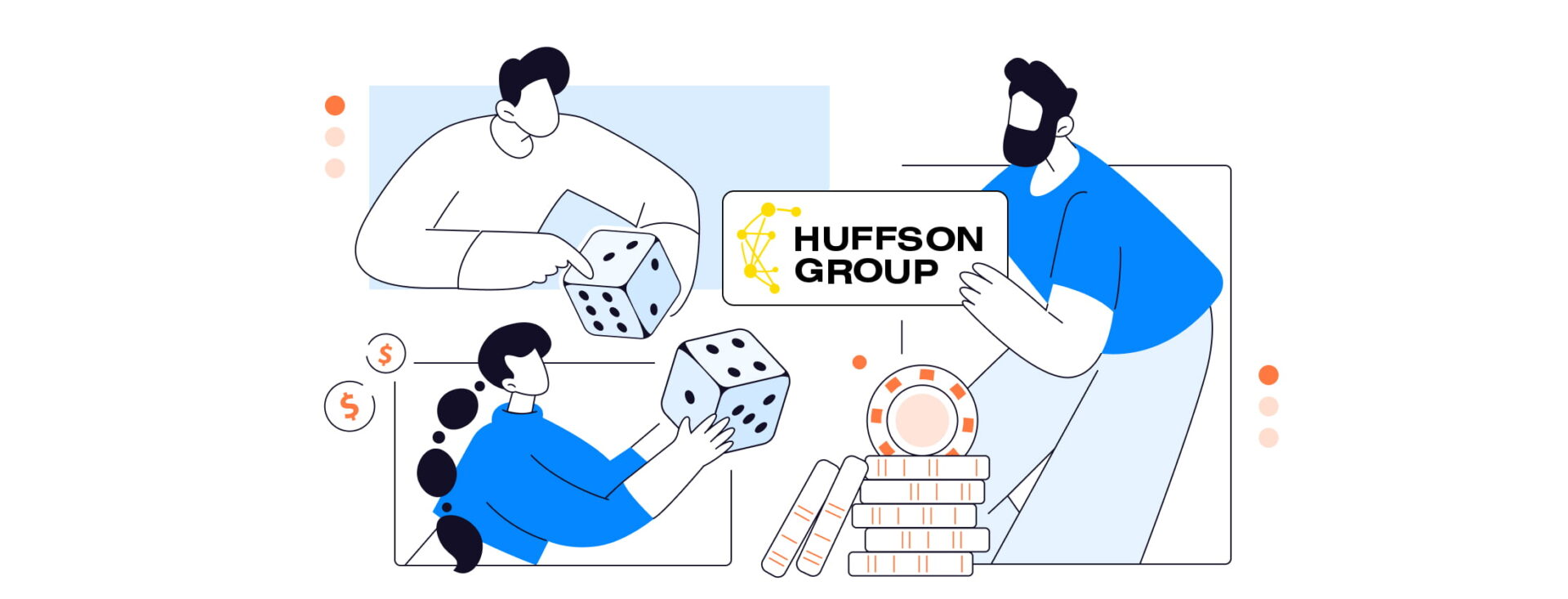
Blog
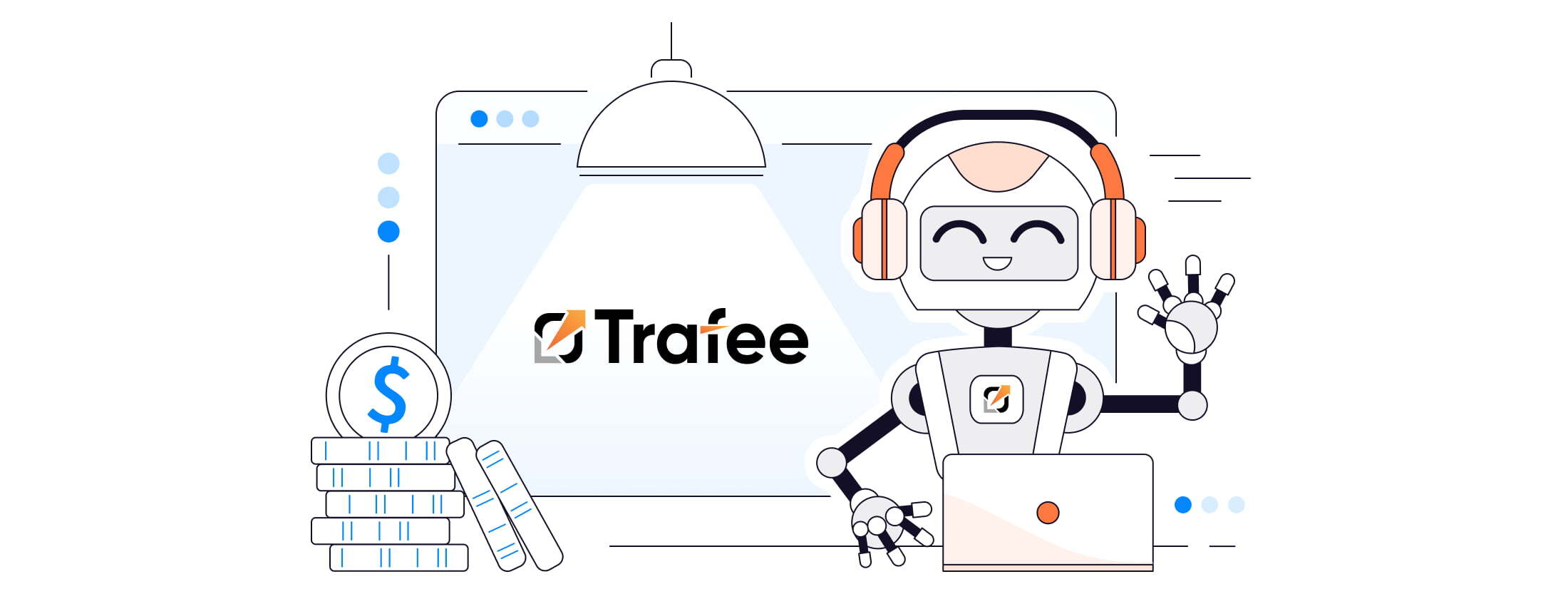
Blog